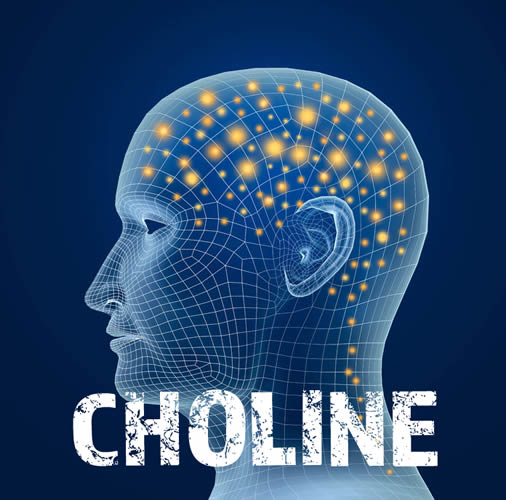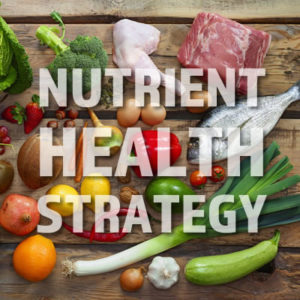Choline is a vital for life.
Today we are going to learn about an essential nutrient required for life, that was once called vitamin B4.
Choline is used by the body to burn fat. It's important for liver function, muscle movement, energy levels and maintaining a healthy metabolism. Choline reduces anxiety and is critical for brain development and nerve function. It's so important to life, that we must naturally produce it. However, we cannot synthesise enough choline to meet our metabolic needs, and the balance must be gained from food.
- Choline is used in the synthesis of phospholipids, which are specialised fat molecules. The most common of these is lecithin which is a critical component of cell membranes. Every cell contains choline, it controls the normal function and structure of cell membranes. More than 90% of the body’s choline is stored in the membranes of cells, with only a small amount circulating as free choline.
- Estrogen levels in men are reduced by choline, it acts as an estrogen methylator.
- Fatty liver disease can be reversed, and a deficiency of choline can cause fatty liver.
- Choline helps fat metabolism and can encourage rapid body mass reduction.
- Choline’s efficient metabolism of fats improves satiety, resulting in weight loss.
- Choline is converted into betaine which functions as a methyl donor needed for many steps in metabolism.
- The need for choline was discovered when it was found that people who were being fed intravenously got fatty livers (choline fixed this). The fatty livers were caused by an accumulation of triglycerides as a result of the liver’s inability to synthesise and release very-low-density lipoprotein.
- Choline is needed to produce acetylcholine, an important neurotransmitter for memory, mood, muscle control, and other brain and nervous functions.
How much choline do I need?
There is no RDA for choline, but an adequate intake is thought to be 550mg per day for men and 425mg for women. But in reality, way more is needed. The upper limit is 3500mg, or 3.5g). When a diet is deficient in vitamin B9, folate, the need for dietary choline rises because choline becomes the primary methyl donor. You will also need more if you drink alcohol frequently or have a fatty liver. A therapeutic intake of choline is 1000-2000mg each day.
Beetane and choline.
Choline must be present for beetane to be synthesised in the body. Beetane is created by choline combining with glycine. Beetane is involved in liver function, cellular reproduction, and helps make carnitine. It also helps the body metabolise an amino acid called homocysteine. Beetane is considered to be a “methyl donor.” This means it aids in liver function, detoxification and cellular functioning within the body. Beetane’s most crucial role is to help the body process fats.
Choline intake strategy.
Eat lots of quality bacon, pastured eggs, fish roe, beef and grass-fed butter. Try and eat at least a couple of liver products each week (either liver, liverwurst or liver pâté). These are all nutrient-dense foods that will transform your health. If you feel that your diet may be lacking, then take a 1g supplement such as choline bi-tartrate.
Lecithin is considered an excellent source of choline because it breaks down into choline in the body. Lecithin can be found in many foods, including soybeans and egg yolks. Lecithin is also used for treating memory disorders such as dementia and Alzheimer's disease.
In Conclusion.
Choline is a vital nutrient that helps your liver and brain function correctly. Growing research indicates that this under-consumed nutrient is critical for brain development and general health throughout our lifespan. We should be aware of foods that provide choline and ways to incorporate them into our diet. A choline supplement may help reduce your risk of fatty liver disease and prevent choline deficiency. Choline deficiency during pregnancy can cause birth defects, so it's especially important for women considering having children.

Choline Foods
Beef liver (100g): 400mg
1 Egg :147mg
Fish roe (100g): 200mg
Beef (100g): 140mg
Bacon (100g): 100mg
Soybeans (½ cup): 107mg
Chicken breast (100g): 90mg
Prawns, salmon, cod (100g): 120-170mg
Shitake mushrooms (½ cup): 58mg
1 large potato: 57mg
Milk (1 cup) 43mg
Yogurt (1 cup) 38mg
Cruciferous veg (1 cup): 20-30mg
Choline intake strategy
Our advice is to take a 1g choline supplement. (Widely available, Amazon has many. Choline bitartrate or CDP Choline are good choices). Eat lots of quality bacon, pastured eggs, quality beef, grass fed butter. Try and eat at least a couple of liver products each week (liver, liver wurst or liver pate). These are all nutrient dense foods that will transform your health.
Adequate intake: 550mg per day for men and 425mg for women.
Theraputic dose: 1000-2000mg (If you drink lots of alcohol or have a fatty liver, you need more).
Upper tolerable limit: 3500mg.
Notes: Ensure you have plenty of glycine and vitamin B9 (folate) in your diet.

